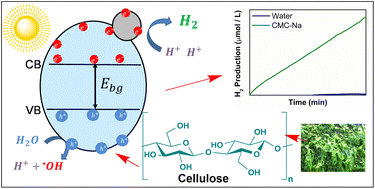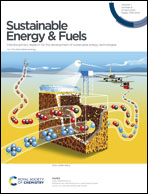Cellulose as sacrificial agents for enhanced photoactivated hydrogen production†
Abstract
The search for new energy sources together with the need to control greenhouse gas emissions has led to continued interest in low-emitting renewable energy technologies. In this context, water splitting for hydrogen production is a reasonable alternative to replace fossil fuels due to its high energy density producing only water during combustion. Cellulose is abundant in nature and as residuals from human activity, and therefore a natural, ecological, and carbon-neutral source for hydrogen production. In the present work, we propose a sustainable method for hydrogen production using sunlight and cellulose as sacrificial agents during the photocatalytic water splitting process. Platinum (Pt) catalyst activates hydrogen production, and parameters such as pH of the system, cellulose concentration, and Pt loading were studied. Using different biomasses, we found that the presence of hemicellulose and xyloglucan as part of the molecular composition considerably increased the H2 production rate from 36 μmol L−1 in one hour for rapeseed cellulose to 167.44 μmol L−1 for acid-treated cellulose isolated from Ulva fenestrata algae. Carboxymethylation and TEMPO-oxidation of cellulosic biomass both led to more stable suspensions with higher rates of H2 production close to 225 μmol L−1, which was associated with their water solubility properties. The results suggest that cellulosic biomass can be an attractive alternative as a sacrificial agent for the photocatalytic splitting of water for H2 production.

- This article is part of the themed collection: Recent Open Access Articles


 Please wait while we load your content...
Please wait while we load your content...